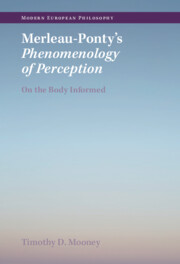Book contents
- Merleau-Ponty’s Phenomenology of Perception
- Modern European Philosophy
- Merleau-Ponty’s Phenomenology of Perception
- Copyright page
- Contents
- Acknowledgements
- Abbreviations
- Preface
- Chapter 1 Phenomenology and Objective Thought
- Chapter 2 Sensations, Associations and Explanations
- Chapter 3 Attention, Judgement and Other Work
- Chapter 4 Back to the Experience of the Body
- Chapter 5 The Body Schema and Our Skills
- Chapter 6 Motor Intentionality and Our Landscapes
- Chapter 7 Others Expressive, Engaged and Exposed
- Chapter 8 Language, Speech and Affectivity
- Chapter 9 Temporality, Subjectivity and Idealisation
- Bibliography
- Index
Chapter 6 - Motor Intentionality and Our Landscapes
Published online by Cambridge University Press: 03 November 2022
- Merleau-Ponty’s Phenomenology of Perception
- Modern European Philosophy
- Merleau-Ponty’s Phenomenology of Perception
- Copyright page
- Contents
- Acknowledgements
- Abbreviations
- Preface
- Chapter 1 Phenomenology and Objective Thought
- Chapter 2 Sensations, Associations and Explanations
- Chapter 3 Attention, Judgement and Other Work
- Chapter 4 Back to the Experience of the Body
- Chapter 5 The Body Schema and Our Skills
- Chapter 6 Motor Intentionality and Our Landscapes
- Chapter 7 Others Expressive, Engaged and Exposed
- Chapter 8 Language, Speech and Affectivity
- Chapter 9 Temporality, Subjectivity and Idealisation
- Bibliography
- Index
Summary
This chapter is devoted to Merleau-Ponty’s account of motor intentional movement as silhouetted by the Schneider case (that of an injured soldier suffering psychological blindness, cognitive rigidity and impaired motility outside habitual action situations). I show how Merleau-Ponty insightfully understands motor intentionality or motor projection as the work of the body schema organising both our postural changes and our phenomenal fields towards habitual or novel outcomes in a horizonal and context-sensitive manner. Without this sub-reflective projection of somatic action solutions and routes to realisation, we would have an agency-neutral body and a congealed spatiality. I maintain that imagined actions supposing skill transpositions can be extrapolated from Merleau-Ponty’s theory, showing that we are not locked into habitual actions or milieus. I go on to argue that he neglects little acts of reflection that compensate for threats to the flow of ‘skilled coping’, while contending that this shortcoming is easily rectified.
Keywords
- Type
- Chapter
- Information
- Merleau-Ponty's Phenomenology of PerceptionOn the Body Informed, pp. 130 - 160Publisher: Cambridge University PressPrint publication year: 2022

